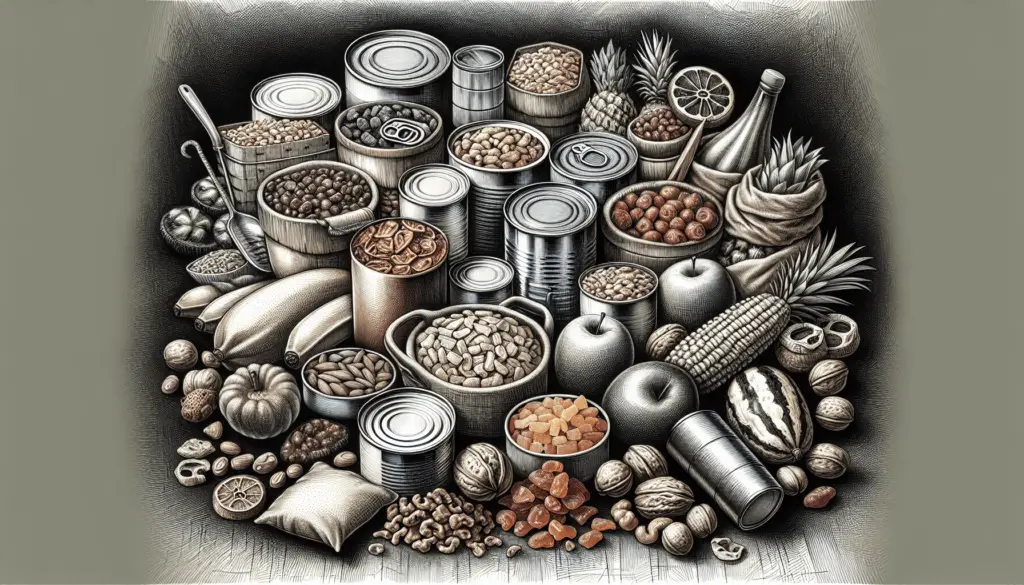Welcome to a fascinating article that will shed light on the importance of understanding nutritional needs in survival situations. When faced with challenging circumstances, such as being stranded in the wilderness or experiencing a natural disaster, having knowledge about the essential nutrients your body requires to stay healthy and energized can make all the difference. In this article, you will learn about the key nutrients needed for survival, how to source them from the environment, and tips for creating a balanced diet in times of crisis. Get ready to empower yourself with essential information that could potentially save your life in a survival scenario. Have you ever wondered what you would need to eat to survive in an emergency or survival situation? When the chips are down and resources are scarce, the importance of proper nutrition becomes even more critical. Here, we will explore the essential nutrients needed to keep you alive and well in times of need.

Importance of Nutrition in Survival Situations
When faced with a survival situation, your body requires adequate nutrients to function optimally. Proper nutrition is crucial for maintaining energy levels, mental clarity, immune function, and overall health. Without the right balance of nutrients, your body may struggle to perform even the most basic tasks required for survival.
In a wilderness survival scenario, your diet may consist of whatever you can forage, hunt, or scavenge. Knowing which foods provide the most bang for your buck in terms of nutrition can mean the difference between life and death. Let’s dive into the essential nutrients needed for survival and how to source them in a survival situation.
Macronutrients: Carbohydrates, Proteins, and Fats
In survival situations, macronutrients play a vital role in providing the necessary energy and nutrients for your body to function properly. Carbohydrates are your body’s primary source of energy, while proteins are essential for repair and growth. Fats are another important source of energy and provide essential fatty acids for optimal health.
When sourcing macronutrients in a survival situation, it’s essential to prioritize high-energy foods that are easy to obtain. For carbohydrates, focus on foraging for fruits, berries, and wild edibles. Proteins can be found in insects, small game, and fish, while fats can be sourced from nuts, seeds, and fatty fish. Understanding the macronutrient content of different foods can help you create a well-rounded diet that meets your energy needs.
Micronutrients: Vitamins and Minerals
In addition to macronutrients, micronutrients such as vitamins and minerals are essential for maintaining overall health and well-being. These nutrients play crucial roles in immune function, energy production, and cellular processes in the body. In a survival situation, it’s important to ensure you’re getting an adequate supply of vitamins and minerals to prevent deficiencies and support optimal health.
To source vitamins and minerals in the wild, focus on incorporating a variety of plant-based foods into your diet. Wild greens, herbs, and vegetables are excellent sources of vitamins A, C, and K, while nuts and seeds provide essential minerals like magnesium, zinc, and iron. By diversifying your diet with a range of wild foods, you can ensure you’re getting a broad spectrum of essential nutrients to support your health in challenging conditions.
Hydration: The Importance of Water
While food is essential for survival, hydration is equally crucial to keep your body functioning optimally. Dehydration can quickly lead to fatigue, confusion, and physical weakness, making it difficult to perform essential survival tasks. In a survival situation, finding a clean and reliable source of water should be a top priority to avoid dehydration and its associated risks.
To stay hydrated in the wild, prioritize finding and purifying water from natural sources such as streams, rivers, and lakes. Boiling water is a simple and effective way to kill bacteria and parasites that may be present, making it safe for consumption. Additionally, you can use a portable water filter or purification tablets to ensure the water you drink is free from harmful contaminants. By staying hydrated, you can support your body’s functions and improve your chances of surviving in challenging conditions.
Creating a Balanced Survival Diet
Now that you understand the importance of nutrition in survival situations and the essential nutrients needed to support your health, it’s time to create a balanced survival diet that meets your needs. By incorporating a variety of foods that provide a mix of macronutrients and micronutrients, you can ensure you’re getting the nutrients necessary to thrive in challenging conditions.
Sample Survival Meal Plan
To help you get started, here’s a sample survival meal plan that includes a variety of foods to meet your nutritional needs:
| Meal | Foods |
|---|---|
| Breakfast | Foraged berries and nuts |
| Wild greens and herbs | |
| Water purified from a stream | |
| Lunch | Insects and larvae for protein |
| Wild vegetables and fruits | |
| Clean water from a natural spring | |
| Dinner | Fish or small game for protein |
| Nuts and seeds for fats | |
| Wild edibles for additional nutrients |
By incorporating a mix of carbohydrates, proteins, fats, vitamins, and minerals into your meals, you can create a balanced diet that supports your energy needs and overall health. Experiment with different wild foods to find combinations that work best for you and provide the nutrients you need to thrive in survival situations.
Tips for Foraging and Hunting
When sourcing food in the wild, it’s essential to have the knowledge and skills necessary to identify safe and nutritious foods. Foraging for wild edibles, hunting small game, and fishing are all valuable skills that can help you secure the nutrients needed for survival. Here are some tips for foraging and hunting in a survival situation:
- Take the time to learn about local plants and animals before foraging or hunting.
- Use field guides and resources to help you identify edible plants and safe hunting practices.
- Be cautious when sampling unfamiliar foods and start with small amounts to avoid potential allergic reactions.
- Practice sustainable foraging and hunting techniques to ensure the local ecosystem remains healthy and balanced.
By honing your foraging and hunting skills, you can increase your chances of finding nutritious foods in the wild and maintaining a balanced diet that supports your survival needs.
Nutrient-Dense Foods to Prioritize
In a survival situation, it’s important to prioritize nutrient-dense foods that provide the most bang for your buck in terms of nutrition. These foods are rich in essential nutrients and can help support your overall health and well-being in challenging conditions. Here are some nutrient-dense foods to prioritize in a survival situation:
- Nuts and seeds: Rich in healthy fats, protein, and essential minerals like magnesium and zinc.
- Berries and fruits: Excellent sources of vitamins, antioxidants, and fiber to support immune function.
- Leafy greens and vegetables: Packed with vitamins A, C, and K, as well as minerals like iron and calcium.
- Insects and larvae: High in protein, fat, and essential amino acids needed for repair and growth.
- Fish and small game: Excellent sources of protein, omega-3 fatty acids, and essential nutrients for optimal health.
By incorporating these nutrient-dense foods into your diet, you can ensure you’re getting the essential nutrients needed to thrive in survival situations and maintain your health under challenging conditions.

Conclusion
Understanding the nutritional needs in survival situations is essential for preparing yourself to face emergencies and challenging conditions. By prioritizing a balanced diet rich in macronutrients, micronutrients, and hydration, you can provide your body with the essentials needed to function optimally and support your overall health and well-being.
Remember to focus on sourcing a variety of foods from the wild that provide the nutrients necessary to thrive in survival situations. By incorporating nutrient-dense foods, honing your foraging and hunting skills, and staying hydrated, you can increase your chances of survival and improve your resilience in the face of adversity. Stay informed, stay prepared, and stay nourished to tackle whatever challenges may come your way. Stay safe, and remember that proper nutrition is key to survival.
